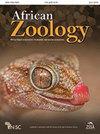A Review of Some Aspects of the Ecology, Population Trends, Threats and Conservation Strategies for the Common Hippopotamus, Hippopotamus amphibius L, in Zimbabwe
IF 0.5
4区 生物学
Q4 ZOOLOGY
引用次数: 10
Abstract
This review explores some ecological aspects of the common hippopotamus (hippo), Hippopotamus amphibius L, threats to its population and contextual peculiarities affecting its conservation in selected water systems in Zimbabwe. Scoping surveys of literature and thematisation of common issues related to hippo ecology, human-hippo conflict and conservation were used for data collection. Hippos play integral ecological roles, such as habitat engineering through track creation in water systems, nutrient recycling by swirl spread of highly organic faeces, harbouring commensal water birds, parasites and leeches. Regardless, the hippo population is not well documented for the country with indications of sharp declines in freshwater systems during the period 1982 to 1992 and gradual recovery thereafter. Habitat degradation, water pollution, climate change, drought-induced extreme water level fluctuation, poaching and deliberate culling, as part of problem-hippo control (PHC), are key drivers of hippo population declines. However, it appears much of the attention is on human-hippo conflict and its consequences, resulting in negative perceptions among human communities. Commercial breeding of hippos for non-consumptive tourism, and export-orientated meat, and ethnomedical mimics of hippo sweat and milk products are new, potentially viable, but unexplored options for conserving and increasing the population of the species in Zimbabwe. Currently, it appears more anti-hippo poaching patrols and awareness campaigns especially in water systems outside protected areas may be key to sustaining the current hippo population. For the future, it is essential to increase the scope for hippo census data to include water systems inside and outside protected areas for sustainable conservation of the species in the country.津巴布韦常见两栖河马的生态学、种群趋势、威胁及保护策略综述
本综述探讨了在津巴布韦选定的水系中常见的河马(河马),两栖河马(hippopotamus amphibius L)的一些生态学方面,对其种群的威胁以及影响其保护的环境特性。文献范围调查和与河马生态、人类与河马冲突和保护相关的共同问题的主题化用于数据收集。河马扮演着不可或缺的生态角色,例如通过在水系统中创造轨道来实现栖息地工程,通过高有机粪便的漩涡传播来循环养分,为共生水鸟、寄生虫和水蛭提供避难所。无论如何,该国的河马数量没有很好的记录,有迹象表明,在1982年至1992年期间,淡水系统的河马数量急剧下降,此后逐渐恢复。栖息地退化、水污染、气候变化、干旱引起的极端水位波动、偷猎和故意扑杀是河马种群数量下降的主要驱动因素,是河马控制问题的一部分。然而,似乎大部分注意力都集中在人类与河马的冲突及其后果上,导致人类社会对河马的负面看法。在津巴布韦,为非消费性旅游和出口导向型肉类而进行河马商业养殖,以及在民族医学上模仿河马的汗水和奶制品,是保护和增加该物种数量的新的、潜在可行的、但尚未探索的选择。目前看来,更多的反河马偷猎巡逻和意识运动,特别是在保护区以外的水系统,可能是维持当前河马数量的关键。未来,有必要扩大河马普查数据的范围,包括保护区内外的水系统,以实现该国物种的可持续保护。
本文章由计算机程序翻译,如有差异,请以英文原文为准。
求助全文
约1分钟内获得全文
求助全文
来源期刊

African Zoology
生物-动物学
CiteScore
2.60
自引率
9.10%
发文量
18
审稿时长
>12 weeks
期刊介绍:
African Zoology , a peer-reviewed research journal, publishes original scientific contributions and critical reviews that focus principally on African fauna in terrestrial, freshwater, and marine ecosystems. Research from other regions that advances practical and theoretical aspects of zoology will be considered. Rigorous question-driven research in all aspects of zoology will take precedence over descriptive research. The Journal publishes full-length papers, critical reviews, short communications, letters to the editors as well as book reviews. Contributions based on purely observational, descriptive or anecdotal data will not be considered.
The Journal is produced by NISC in association with the Zoological Society of South Africa (ZSSA). Acceptance of papers is the responsibility of the Editors-in-Chief in consultation with the Editors and members of the Editorial Advisory Board. All views expressed are those of the author and not necessarily those of the Editors or the Department.
 求助内容:
求助内容: 应助结果提醒方式:
应助结果提醒方式:


